
Get World-Class Health Screenings at Euracare

Everything we do is driven by our commitment to revolutionising healthcare on the African continent. Our state-of-the-art facilities and experienced staff are dedicated to ensuring you receive the highest level of care possible. We offer various medical services, from full cardiac screenings to comprehensive breast cancer screening packages.
How to Keep Your Heart Healthy
When it comes to heart health, it’s important to be proactive. Many people wait until they experience symptoms of heart disease before getting screened, but by then, it may be too late.
A full cardiac screening can provide peace of mind and help you catch any potential problems early. This simple test can give you peace of mind by checking for any potential problems with your heart and blood vessels. The screening usually only takes a few minutes and is painless.
If you’re over 40 or have other risk factors for heart disease, it’s a good idea to talk to your doctor about getting a cardiac screening. It is one of the best ways to prevent heart disease. Don’t wait until it’s too late to take care of your heart. Get a full cardiac screening at Euracare Adjiringano today.
To make an appointment, call 0500 809 024 or email info@euracare.com.gh.
How Breast Cancer Screenings Can Save Your Life
Breast cancer is the second most common form of cancer in women. The good news is that breast cancer is highly treatable when caught early. That’s why it’s so important to get screened regularly.
Euracare Adjiringano is offering a breast cancer screening package between 1 October and 30 November. To book an appointment, call: 030 273 9390
There are several ways to screen for breast cancer, including mammograms, breast ultrasounds, and self-breast exams. At Euracare, we offer two main breast cancer screenings:
Mammogram
A mammogram is an X-ray picture of the breast. Doctors use a mammogram to look for early signs of breast cancer.
Mammograms are an important tool in the early detection of breast cancer. They can often find tumours that are too small to feel, and they can also help identify breast changes that may be early signs of cancer.
If you’re over 40 or have a family history of breast cancer, make an appointment for a mammogram today. It could be the best decision you ever make.
Euracare Nigeria is offering mammograms for just N30,000 until 30 November. To make an appointment, call or WhatsApp us at +23490 8831 4660
Breast ultrasound
A breast ultrasound is a safe and non-invasive test that can help to identify small tumours that may not be detectable through a mammogram. Ultrasound is particularly effective in younger women, as their breast tissue is typically denser and more difficult to image with x-rays.
If you are concerned about your risk of breast cancer, we can help.
Euracare Nigeria is offering ultrasound screenings for just N22,500 until 30 November. To make an appointment, call or WhatsApp us at +23490 8831 4660
Screening for breast cancer can save your life. Get an ultrasound screening today.
A Hospital in Your Home
When it comes to your health, there’s no such thing as a one-size-fits-all solution. That’s why Euracare Hospital and Wellness Centre offers a variety of at-home services, so you can receive the care and treatment that’s right for you in the comfort of your own home. Our at-home services include:
- Laboratory Services
- EMS Pulse
- Medical Services
If you’re looking for convenience, comfort, and expert care, look no further than Euracare Hospital and Wellness Centre.
At Euracare, we believe that every patient deserves world-class care. We offer a wide range of services and treatments that are designed to meet the unique needs of each individual who comes to us for help.
If you are looking for quality care, book an appointment with us today. We look forward to meeting you and giving you the best possible care.
Book an appointment here
Ghana: info@euracare.com.gh
Nigeria: info@euracare.com.ng
Nigeria: +234 700 3872 2273
Ghana: +233 500 809 024
Home page

What You Need to Know About Breast Cancer Awareness Month

What You Need to Know About Breast Cancer Awareness Month
October is Breast Cancer Awareness Month, and there’s no better time to learn about the disease, its symptoms, and how to prevent it.
Breast cancer is the most common cancer among women worldwide, and though survival rates have improved in recent years, it’s still a leading cause of cancer death in women.
Anyone can get breast cancer, but certain risk factors make some women more likely to develop the disease. These include:
- Increasing age
- A family history of breast cancer
- Dense breasts
- Personal history of certain forms of cancer
Luckily, you can take steps to reduce your risk of developing breast cancer. These include:
- Staying at a healthy weight
- Exercising regularly
- Limiting alcohol consumption
- Not smoking
- Undergoing regular screenings
“There can be life after breast cancer. The prerequisite is early detection.” – Ann Jillian.
Breast cancer awareness is important because it can save lives. The earlier the disease is detected, the better the chances of successful treatment. So make sure to talk to your doctor about your risk factors and get screened regularly.
Early detection is key when it comes to treating breast cancer successfully. There are two main types of screenings:
- Mammography: An x-ray exam of the breasts can detect tumours that cannot be felt during a CBE. It is recommended that women age 40 and over get a mammogram every one to two years.
- Clinical breast exams (CBEs): Clinical breast exams are physical exams performed by healthcare professionals that look for changes in the breasts that may be signs of cancer.
Though great strides have been made in early detection and treatment options, breast cancer remains the most common tumour diagnosed in females globally (with the exception of non-melanoma skin cancers).
While breast cancer awareness is incredibly important, it’s not just something we should think about during October – it’s something we should be aware of all year round!
Earlier this year, Euracare Dialysis Centre proudly partnered with Maud Lokko Breast Cancer Foundation at Lekam Hospital to offer free breast screening to 266 patients onsite. Through early detection, people can receive more treatment options and have a better chance of survival.
Euracare offers world-class interventional oncology services. We provide management and services for many types of oncological conditions. To learn more about our specialist services, visit adjiringano.euracare.com.gh.
Ghana: info@euracare.com.gh
Nigeria: info@euracare.com.ng
Nigeria: +234 700 3872 2273
Ghana: +233 500 809 024
Home page
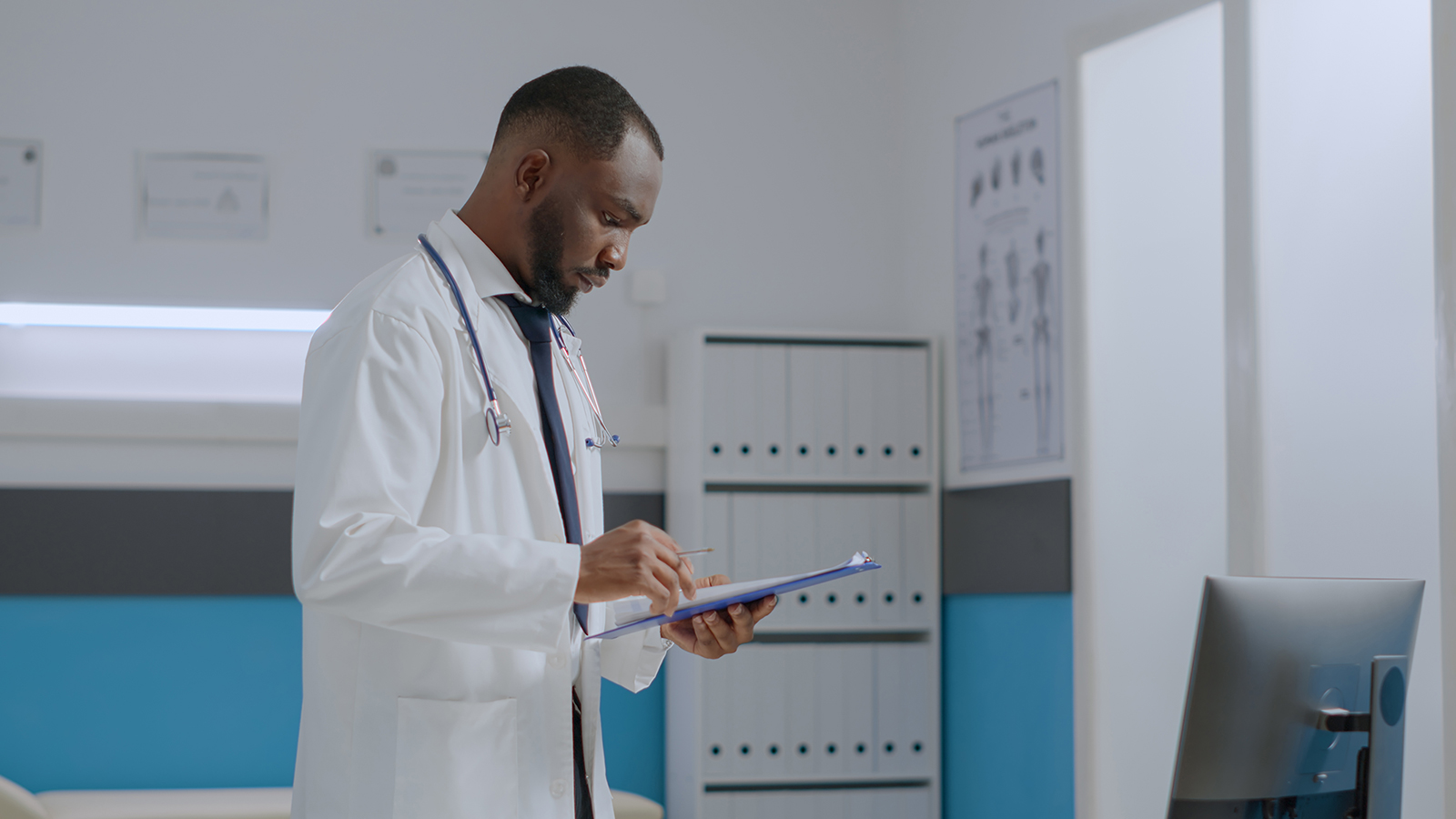
Euracare offers advanced diagnostic services
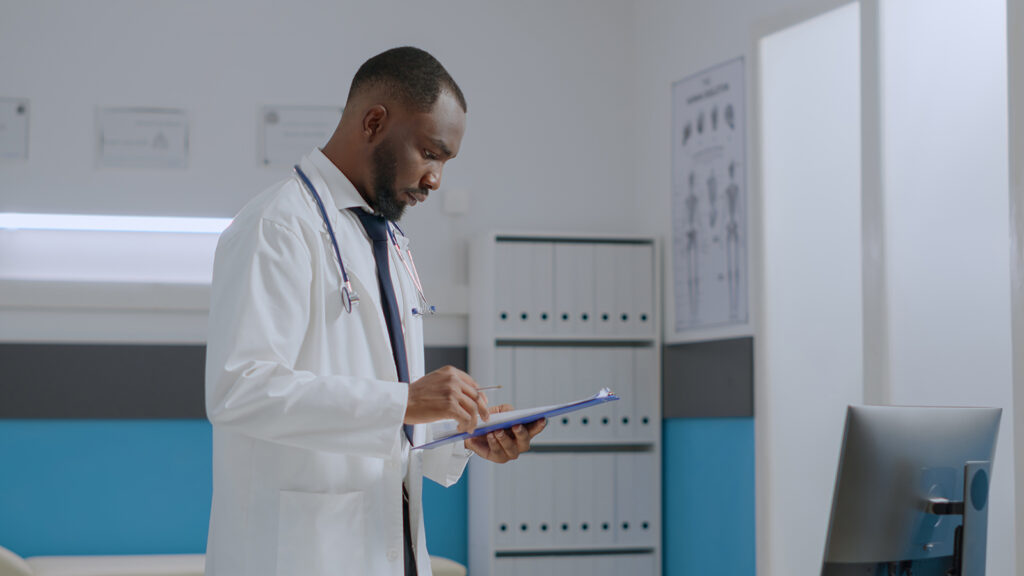
Euracare offers advanced diagnostic services
Don’t waste precious time on the wrong treatment. Get an accurate diagnosis at Euracare.
The future of healthcare has never looked brighter! With diagnostic services on the rise, preventive therapy through regular testing is becoming more popular than ever before.
Being healthy often translates to a balanced diet, and regular exercise while going to the doctor is associated with being sick. People believe you should wait to seek medical attention until something happens. In reality, maintaining good health requires routine checkups with your doctor for preventative care. A timely diagnosis of any ailment can improve successful treatment and prevent the condition from worsening.
Why a preventive health checkup is important
Enhances longevity
Preventative treatment increases your lifespan. Early diagnosis and treatment can improve your quality of life. In some cases, if a condition is detected early, doctors are able to stop the disease from developing.
Improves your health
Preventive care allows medical professionals to detect problems before they become too severe. Annual wellness visits typically include weight assessments and blood tests that can identify diabetes, cholesterol, and thyroid levels, along with radiology investigations like x-ray, ECGs, and stress tests that can diagnose medical ailments early.
Reduced medical expenses
Maintaining your health is the best way to avoid excessive medical expenditures. Early detection of a problem can help you significantly reduce costs and get treatment sooner, which means better outcomes for both yourself and your wallet!
Services offered:
- Pathology services
- X-ray
- Advanced cardiac imaging
- CT Scan
- MRI
- Ultrasound
- 3D dental panoramic x-ray
- Digital mammography
Advanced diagnostic testing solutions have made early medical intervention possible. They help healthcare experts develop the best treatment plan for their patients.
Our cutting-edge equipment ensures that we provide you with advanced diagnostic services and world-class care. To book an appointment for your next checkup or wellness screening, visit adjiringano.euracare.com.gh
Ghana: info@euracare.com.gh
Nigeria: info@euracare.com.ng
Nigeria: +234 700 3872 2273
Ghana: +233 500 809 024
Home page
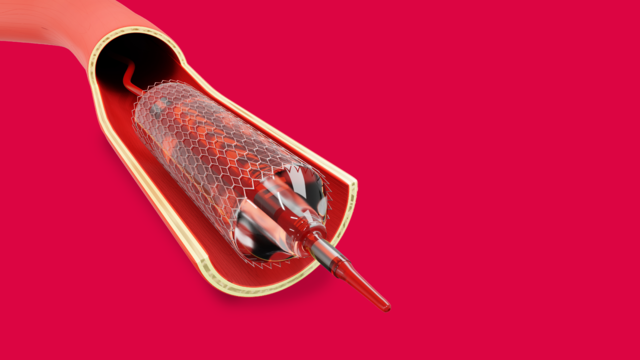
We use embolisation to treat certain cancers and non-cancerous growths

We use embolisation to treat certain cancers and non-cancerous growths
What is embolisation?
Almost any area of the body can be treated with embolisation to control or stop irregular bleeding. Embolisation is frequently used to treat the following conditions:
- Certain cancers and non-cancerous growths through prostatic artery embolisation (PAE) and uterine fibroid embolisation (UFE). The discomfort brought on by tumour bleeding can be lessened by embolisation.
- Bleeding that follows a severe injury. This therapy is well suited for controlling bleeding in the abdomen or pelvis.
- Bleeding from lesions in the digestive tract, such as ulcers or diverticulitis. In cases of gastrointestinal bleeding from any source, embolisation is frequently used as the first line of therapy.
- Bleeding caused by vascular abnormalities.
What is prostatic embolisation?
Benign prostatic hyperplasia (BPH) causes discomfort in the lower urinary tract that can be alleviated with a minimally invasive procedure called prostatic artery embolisation (PAE). The most frequent benign tumour identified in men is BPH, which is an enlargement of the prostate gland that is not malignant.
What are the symptoms of BPH
- Urgent or frequent need to urinate.
- Increased frequency of urination at night (nocturia)
- Difficulty urinating.
- Inconsistent urine stream
- Dribbling at the end of urination.
- Inability to empty the bladder.
What is uterine fibroid embolisation?
What are uterine fibroids, and how do they occur?
Fibroid tumours are benign, non-cancerous growths that form in the uterine muscle. Although fibroids do not usually manifest symptoms, for some women, they can cause discomfort and severe bleeding due to their size and placement. After menopause, when the blood level of the feminine hormone oestrogen drastically drops, they usually get better. However, menopausal women receiving hormone replacement treatment and more oestrogen may not experience any symptom relief.
Symptoms of fibroids?
Depending on location, size and number of fibroids, they may cause:
- Heavy, prolonged and irregular menstrual periods
- Pelvic pain, pressure or heaviness
- Frequent back or leg pains
- Pain during sexual intercourse
- Bladder pressure causing a constant urge to urinate
- Bowel pressure, leading to constipation and bloating
- Abnormally enlarged abdomen
Benefits of embolisation
Embolisation is non-surgical and minimally invasive, which means you will experience:
- Less pain
- Low risk of infection
- Short hospital stays
- Quick recovery time
- Less scarring
Our interventional radiologists, Dr Hammed Ninalowo and Dr Benjamin Dabo Sarkodie are highly trained to perform PAE, UFE, and other minimally invasive procedures.
To book your appointment visit https://adjiringano.euracare.com.gh/appointment/ or contact
Dr Hammed Ninalowo (Nigeria)
+234 700 3872 2273
Dr Dr Benjamin Dabo Sarkodie (Ghana)
+233 500 809 024
To learn more about prostate cancer, visit our YouTube channel. Also, watch our UFE video here.
Home page

Don’t let your weight drag you down

Don’t let your weight drag you down
If you’re suffering from obesity, weight-loss surgery could change your life. Euracare offers multiple services and procedures to assist with weight loss and improving longevity.
You should consider bariatric surgery (weight loss surgery) if you cannot achieve weight loss through a healthy diet, regular exercise, or prescribed medication. Although weight loss surgery is not a quick fix or an easy way out, it is a safe alternative for individuals struggling to achieve sustainable weight loss results.
Different bariatric surgeries are performed depending on the patient’s individual needs. Gastric bypass and sleeve gastrectomy are the most common procedures. Bariatric surgery decreases the stomach’s storage capability and reduces food intake making you feel full sooner than usual. Specific bariatric procedures also restrict calorie absorption.
There are endless benefits to bariatric surgery that not only enhance your physical performance and appearance but also improve your emotional well-being:
A weight reduction will result in:
- Increased mobility and better quality of life
- Decreased chance of type 2 diabetes
- Improved cardiovascular health and reduced blood pressure
- Alleviate other medical conditions
- Eliminate obstructive sleep apnea
- Reduce joint pain
All the gain without the pain
If you’re looking for a less invasive method to assist with weight loss, Wellness Centre Nigeria offers electro muscle stimulation therapy (EMS).
Electro muscle stimulation (EMS) stimulates muscle contraction using electrical impulses, strengthening weak muscles, reducing swelling, relieving pain, and assisting wounds throughout the healing process.
With EMS therapy, you can quickly burn 2500 calories per session, which equals 4-6 hours of conventional training.
Other than weight loss, EMS has multiple benefits, which include:
- Reduced pain when performing physical activity
- Muscle contraction to help maintain muscle tone and strength
- Tissue and injury healing
To book an appointment or find out more about our weight loss services, visit https://adjiringano.euracare.com.gh/
For any requests or booking information, reach out to us using the following email addresses:
Ghana: internationalpatients@euracare.com.gh
Nigeria: internationalpatients@euracare.com.ng
Nigeria: +234 700 3872 2273
Ghana: +233 500 809 024
Home page
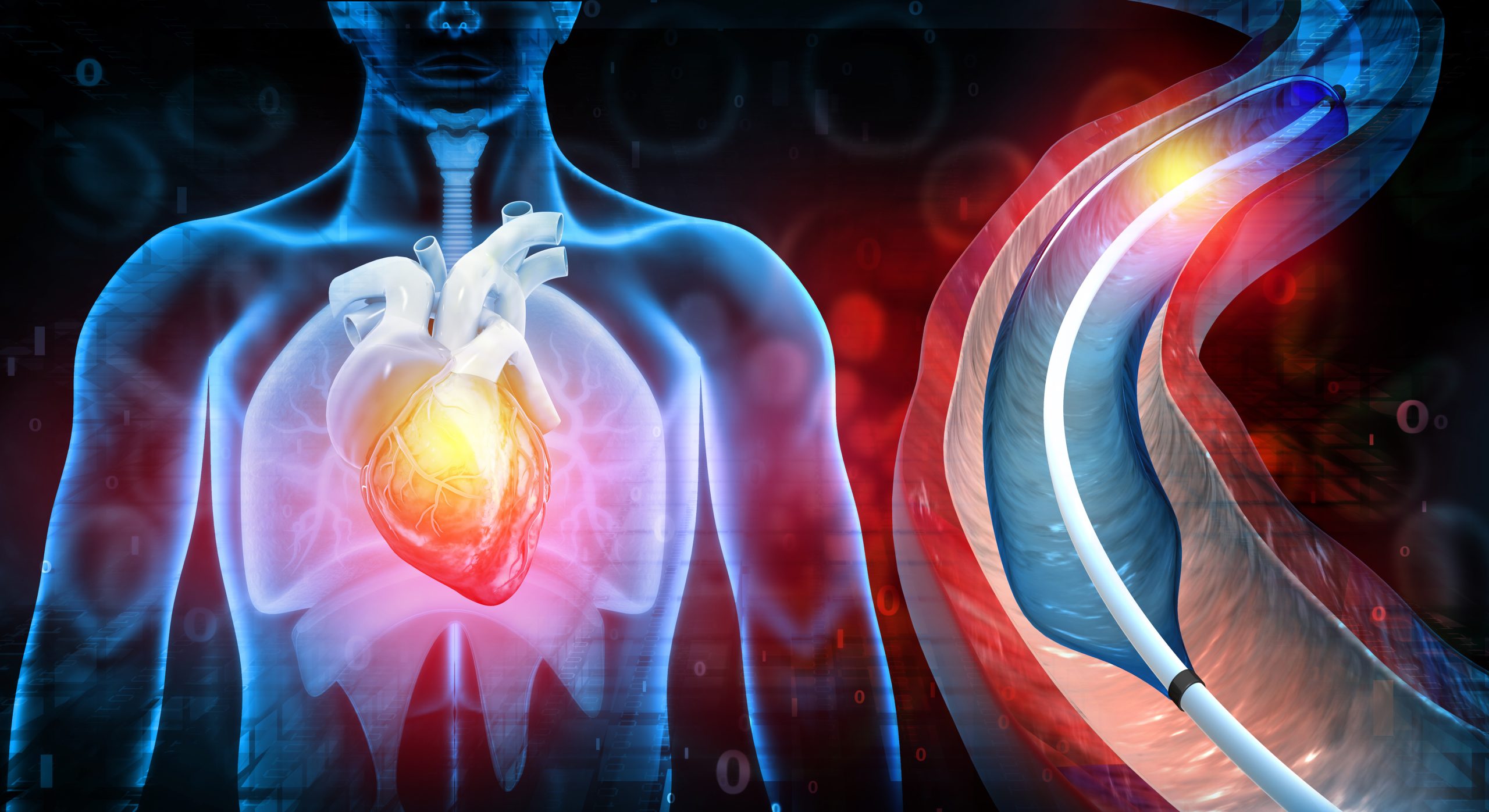
Interventional Cardiology

What is interventional cardiology?
Interventional cardiology uses nonsurgical, catheter-based procedures to treat conditions such as:
- Congenital heart disease
- Heart valve abnormalities
- Clogged or weak blood vessels and restricted arteries
What to expect when visiting an interventional cardiologist:
- A medical history evaluation and physical exam to assess blood pressure, heart health, blood vessel function and lung health
- Imaging and lab tests
- Condition diagnosis and treatment plan
When should you see an interventional cardiologist?
Your primary care physician can address general heart health problems and illnesses like excessive blood pressure and high cholesterol, which raise your risk for heart disease. But you might need to see an interventional cardiologist if you experience a significant heart or blood vessel problem.
Consult an interventional cardiologist as soon as possible if you:
- Have received EKG testing variations that suggest a blockage in your coronary artery
- Had a heart attack and experienced unstable angina or heart valve dysfunction
- Require heart procedures, including angioplasty, cardiac catheterisation, or heart valve repair
Conditions treated by interventional cardiologists:
- Angina – Narrowed arteries from coronary heart disease that cause chest pain
- Heart attack – When blood clots stop the circulation of oxygen-rich blood to the heart
- Heart failure – Your heart isn’t strong enough to pump enough blood throughout your body
- ST-Elevation Myocardial Infarction (STEMI) – A severe heart attack that happens when one of your heart arteries is blocked
- Arrhythmia – Abnormal heart rhythm (your heart beats too slow, too fast, or irregularly)
- Myocarditis – Heart inflammation
- Cardiomyopathy – An enlarged or weakened heart muscle
- Congenital heart defects – Heart issues and defects occurring at birth
Dr Tosin Majekodunmi is Euracare Nigeria’s Medical Director, Chief of cardiology, and interventional cardiologist specialising in adult and paediatric congenital and structural heart disease. Dr Tosin was determined to contribute to improving healthcare in his native Nigeria. He served as Tristate Cardiovascular Associates’ Chief of Structural Heart Disease from 2013 until joining Euracare in 2016.
At Euracare, we ensure that you receive world-class medical treatment. Our interventional cardiology team develops your care plan utilising a multidisciplinary approach best suited to your individual needs.
If you’re suffering from a heart condition or are experiencing any of the symptoms mentioned above, book an appointment with our cardiology experts.
adjiringano.euracare.com.gh
Ghana: internationalpatients@euracare.com.gh
Nigeria: internationalpatients@euracare.com.ng
Nigeria: +234 700 3872 2273
Ghana: +233 500 809 024
Home page
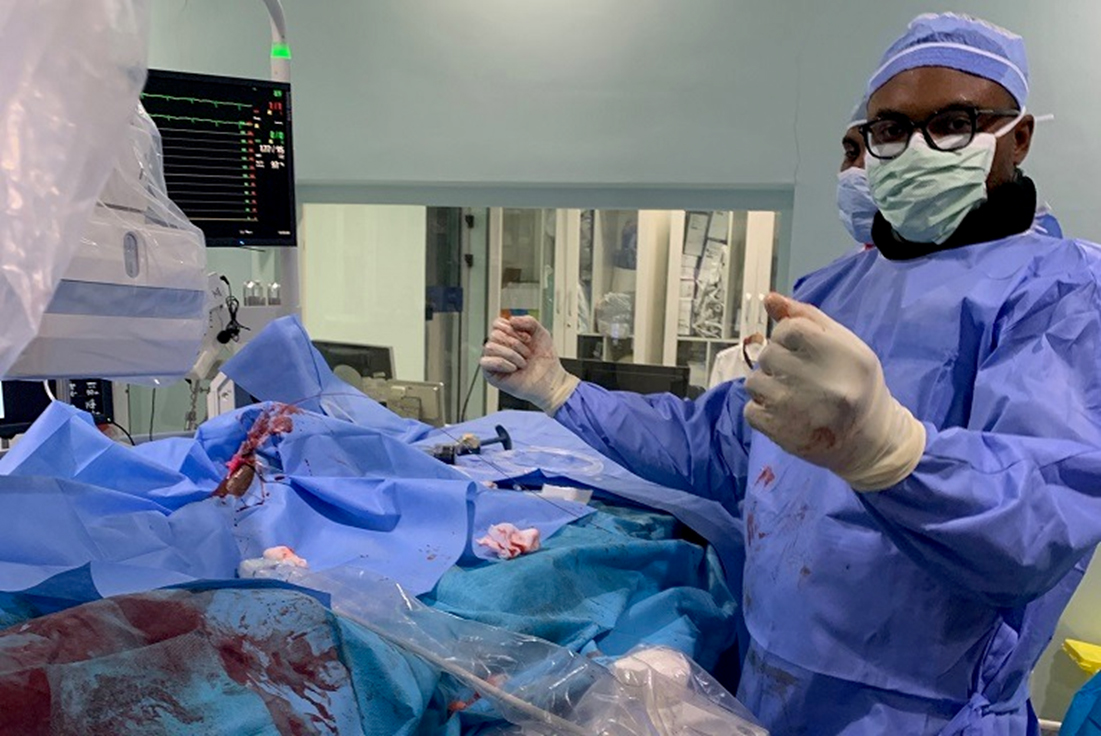
Interventional Radiology
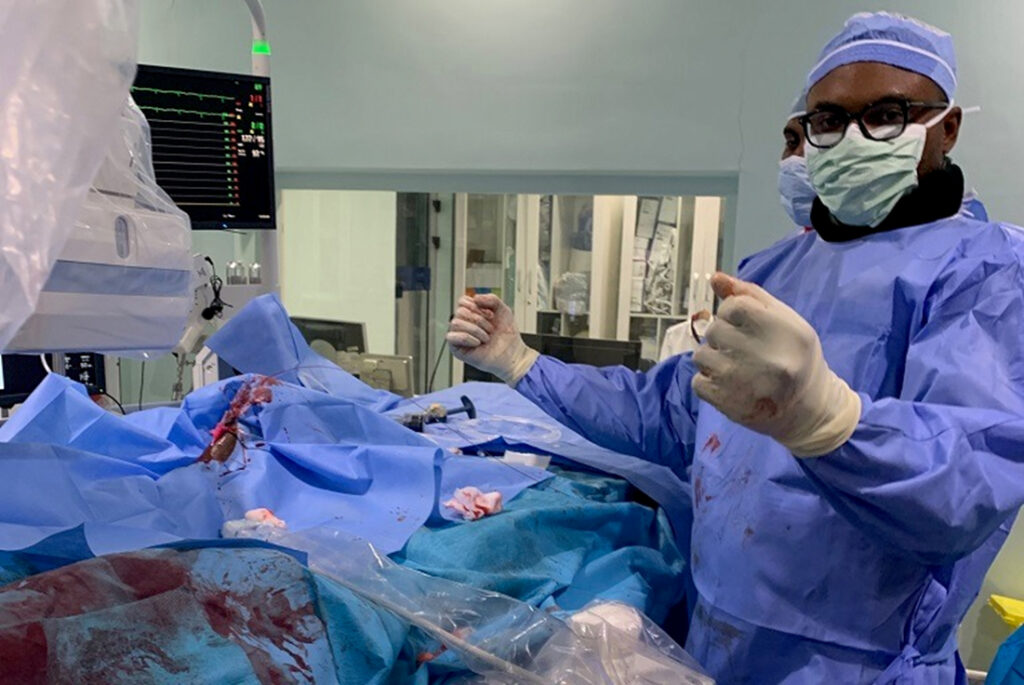
Interventional Radiology: The Future of Minimally Invasive Medical Treatment
Introduction Interventional Radiology (IR) is an advanced medical specialty that uses minimally invasive techniques and advanced medical imaging technology to diagnose and treat various health conditions.
This innovative medical treatment approach offers patients several key benefits, including reduced recovery time, decreased pain and risk, and more cost-efficient procedures.
With technological advancements continuing to drive the growth of interventional radiology, the future looks bright for this exciting and highly impactful medical specialty.
Interventional Radiologists (IR) – What They Do
Euracare is proud to have two of West Africa’s leading experts in IR, Dr. Hammed Ninalowo and Dr. Benjamin Sarkodie, who are at the forefront of providing exceptional care to patients using this specialized treatment method.
Dr Hammed Ninalowo, is a US-trained Vascular and Interventional Radiologist who completed his training at the prestigious University of Pennsylvania and is the first US-trained Physician to offer the full spectrum of interventional Radiology services in Nigeria.
Dr. Benjamin Sarkodie is a fellow of the West African College of Surgeons and is Euracare Adjiringano’s Medical Director and Head of Radiology. Dr. Benjamin was the first Interventional Radiologist in Ghana.
The minimally invasive nature of IR reduces recovery duration, pain, and medical risk to patients who typically require conventional “open surgery.” With continuous technological advancement, the treatments IR can successfully perform are advancing and expanding.
Interventional Radiology is performed by an Interventional Radiologist, who uses medical imaging technology to guide a catheter or other small instruments through the body to the treatment area.
The Interventional Radiologist then performs the procedure while monitoring the real-time images of the treatment area, ensuring maximum precision and accuracy.
Procedures carried out by Interventional Radiologists
Interventional Radiologists perform a number of procedures. These including:
- Blocked Fallopian tubes
- Closed vessels
- Malignant tumors: lungs and liver cancer
- Fibroid embolization
- Non-healing ulcers on diabetic patient’s legs
- Angiography
- Angioplasty
- Stenting
- Thromboly
- Embolization of GI bleeds
- Ablation
- Transjugular Intrahepatic Portosystemic Shunt- TIPS
- Image-guided Biopsy
- Venous Access
- Gastrointestinal Interventions
- Hepatobiliary Interventions
- Gynaecologic Intervention
- Genitourinary Interventions
- Arterial and Venous Interventions
- Dialysis Access Intervention
- Musculoskeletal Interventions
- Interventional Oncology
- Pain Management
- Lymphatic Interventions
Equipment used for interventional radiology procedures
Interventional Radiology procedures require advanced medical imaging technology and specialized equipment to ensure accuracy and precision. Some of the kits are:
- X-ray machines
- CT scanners
- MRI machines
- Ultrasound machines
These technologies and equipment allow Interventional Radiologists to perform complex procedures with optimal efficiency and minimal risk to the patient.
Overall Interventional Radiology is a cost-efficient and minimally invasive method of treating various health conditions. With advanced medical imaging technology and specialized equipment, Interventional Radiologists can provide patients with safe and effective treatments that minimize the risks associated with traditional open surgery. If you are suffering from any of the afore-mentioned conditions listed above, visit our website to book an appointment or get in touch with one of our IR specialists.
What can it treat
Interventional Radiology can treat:
- Narrowing/expanding of arteries
- Bleeding (haemorrhage)
- Blood clots in the lung (pulmonary embolism, PE)
- Dilated veins (varicose veins)
- Non-healing ulcers on diabetic patient’s legs
- Blocked veins
- Tumour therapies
- Uterine fibroids
- Kidney/gall stones
If you’re suffering from any of these diseases or require an expert diagnosis, visit our website to book an appointment or get in touch with one of our IR specialists.
Dr Hammed Ninalowo (Euracare Nigeria): +234 700 3872 2273
Dr Benjamin Dabo Sarkodie (Euracare Adjiringano): +233 500 809 024
Frequently Asked Questions
Answer: Interventional Radiology is a minimally invasive procedure with a lower risk of complications than traditional surgery. With advanced medical imaging and equipment, IR has become a safe and effective treatment method.
Answer: Interventional Radiology is designed to cause minimal discomfort to the patient. Most IR procedures do not require general anesthesia or local anesthesia, instead mild sedation is used. This makes the procedure less painful and less stressful for the patient.
Answer: The length of an Interventional Radiology procedure depends on the complexity of the procedure. Most IR procedures are completed within a few hours, and the patient can go home the same day. This makes IR a convenient and efficient option for many patients.
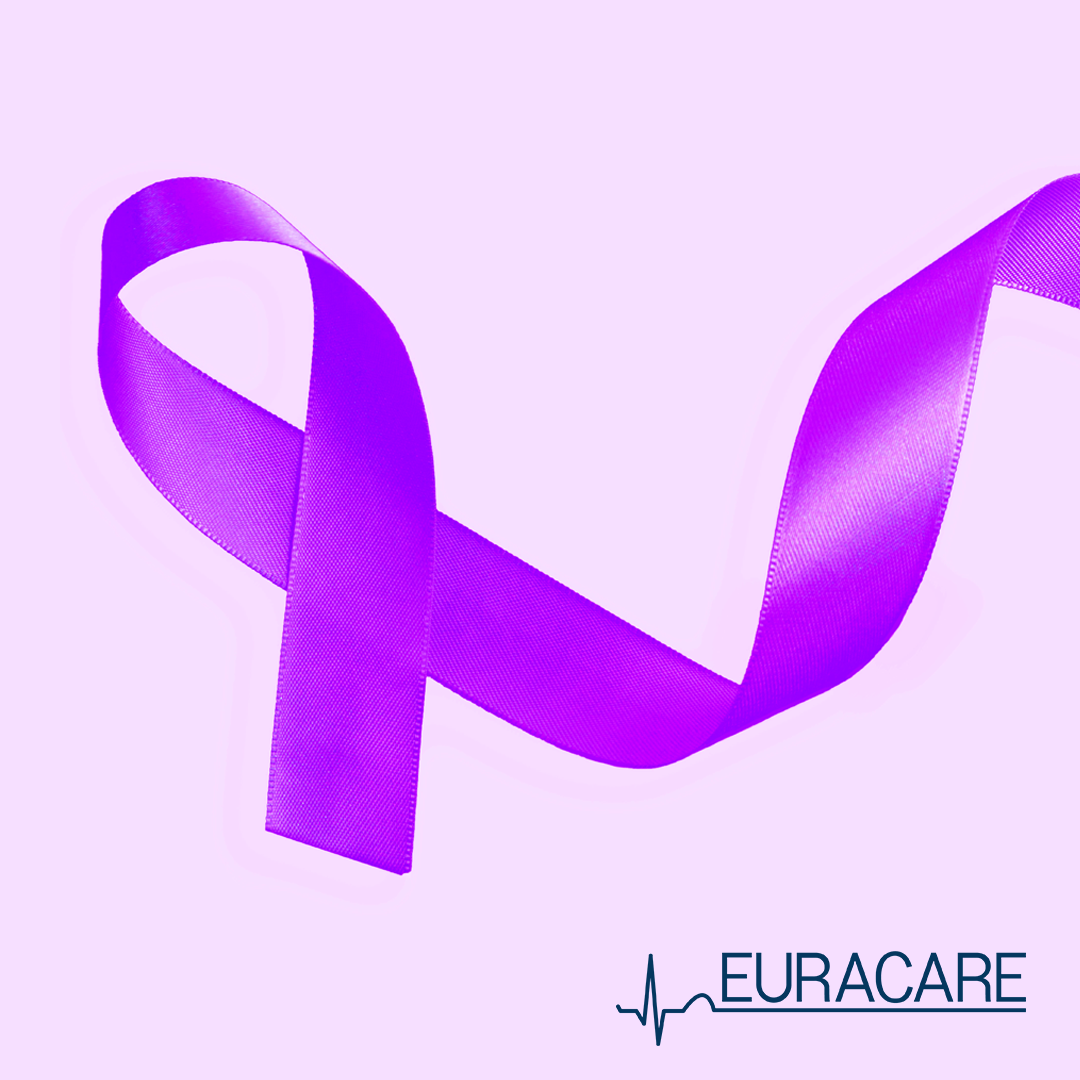
National Cancer Survivors Day is June 5th
National Cancer Survivors Day is dedicated to commemorating and honouring those who are living with a history of cancer.
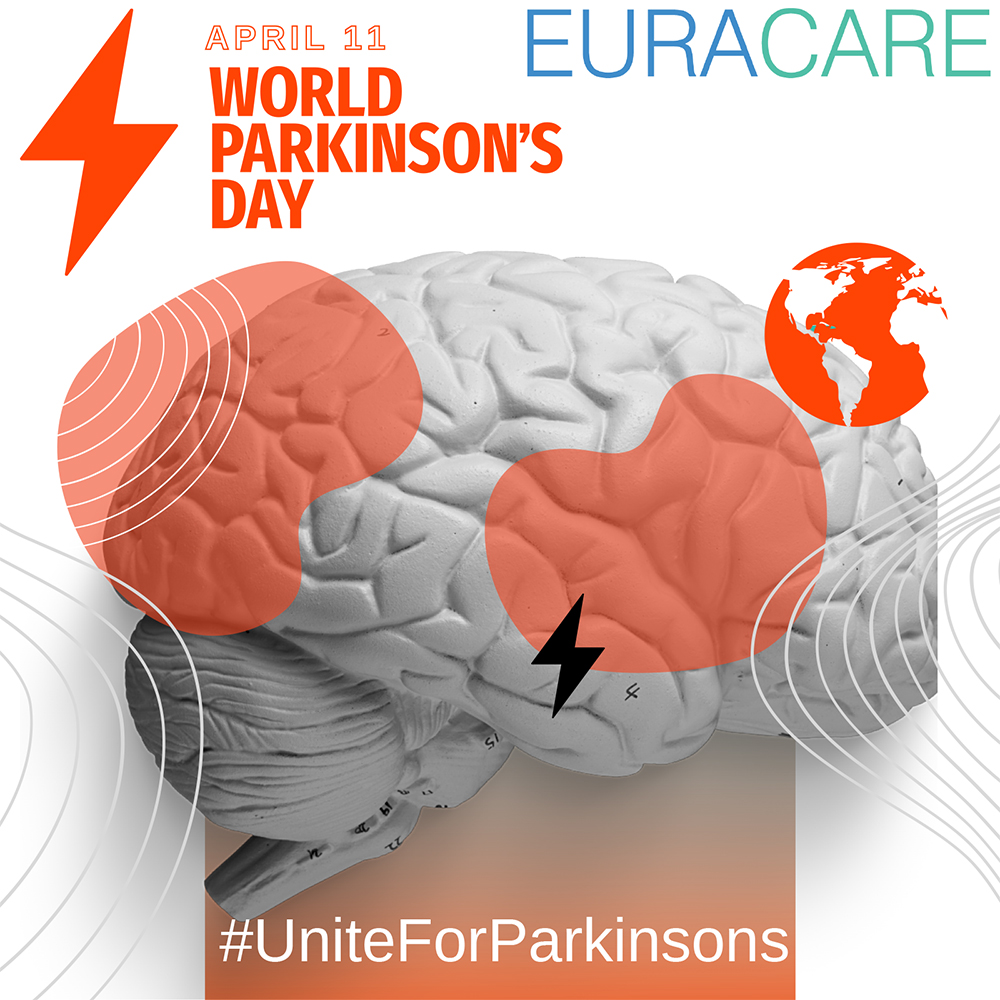
World Parkinson’s Day is April 11th
What is Parkinson’s disease?
Parkinson’s disease is a neurological movement disorder. Common symptoms include tremors, slowness of movement, stiff muscles, unsteady walking and balance, and coordination problems. The symptoms vary widely amongst individuals. Although there is no cure for the disease, there is a treatment that improves the quality of life and helps the person living with PD cope with the changes the body undergoes.
The disease usually starts out slowly and worsens over time. If you have Parkinson’s disease, you may shake, have muscle stiffness, and have trouble walking and maintaining your balance and coordination. As the disease worsens, you may have trouble talking, and sleeping, have mental and memory problems, experience behavioural changes, and have other symptoms. None of these changes are part of normal aging.
Who gets Parkinson’s disease?
About 50% more men than women get Parkinson’s disease. It is most commonly seen in persons 60 years of age and older. However, up to 10% of patients are diagnosed before age 50. Although very rare, it can occur in young adults and children.
Is Parkinson’s disease inherited?
Generally, Parkinson’s disease is sporadic, i.e. not inherited. There is some belief that some cases of early-onset Parkinson’s disease – disease starting before age 50 – may be inherited
How is Parkinson’s disease diagnosed?
The diagnosis of Parkinson’s disease is based on the clinical exam the doctor performs. There is no test for Parkinson’s disease. Your doctor will however run blood tests and a brain MRI to ensure that there is no other explanation for the symptoms you are experiencing.

